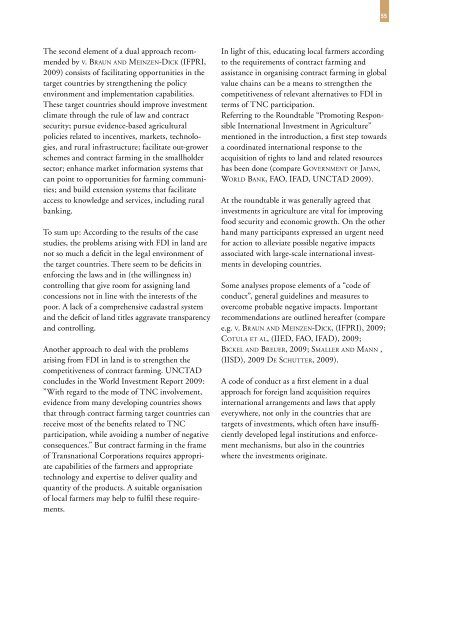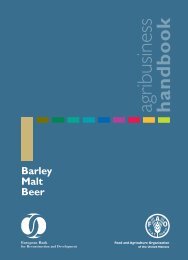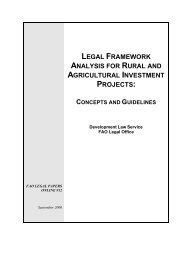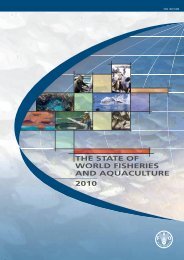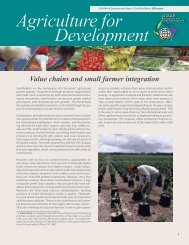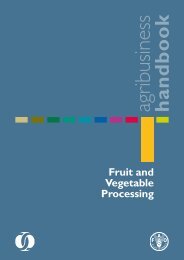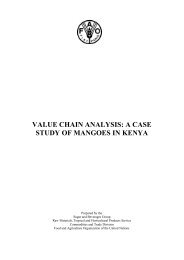Foreign Direct Investment (FDI) in Land in developing countries
Foreign Direct Investment (FDI) in Land in developing countries
Foreign Direct Investment (FDI) in Land in developing countries
- No tags were found...
You also want an ePaper? Increase the reach of your titles
YUMPU automatically turns print PDFs into web optimized ePapers that Google loves.
55The second element of a dual approach recommendedby v. Braun and Me<strong>in</strong>zen-Dick (IFPRI,2009) consists of facilitat<strong>in</strong>g opportunities <strong>in</strong> thetarget <strong>countries</strong> by strengthen<strong>in</strong>g the policyenvironment and implementation capabilities.These target <strong>countries</strong> should improve <strong>in</strong>vestmentclimate through the rule of law and contractsecurity; pursue evidence-based agriculturalpolicies related to <strong>in</strong>centives, markets, technologies,and rural <strong>in</strong>frastructure; facilitate out-growerschemes and contract farm<strong>in</strong>g <strong>in</strong> the smallholdersector; enhance market <strong>in</strong>formation systems thatcan po<strong>in</strong>t to opportunities for farm<strong>in</strong>g communities;and build extension systems that facilitateaccess to knowledge and services, <strong>in</strong>clud<strong>in</strong>g ruralbank<strong>in</strong>g.To sum up: Accord<strong>in</strong>g to the results of the casestudies, the problems aris<strong>in</strong>g with <strong>FDI</strong> <strong>in</strong> land arenot so much a deficit <strong>in</strong> the legal environment ofthe target <strong>countries</strong>. There seem to be deficits <strong>in</strong>enforc<strong>in</strong>g the laws and <strong>in</strong> (the will<strong>in</strong>gness <strong>in</strong>)controll<strong>in</strong>g that give room for assign<strong>in</strong>g landconcessions not <strong>in</strong> l<strong>in</strong>e with the <strong>in</strong>terests of thepoor. A lack of a comprehensive cadastral systemand the deficit of land titles aggravate transparencyand controll<strong>in</strong>g.Another approach to deal with the problemsaris<strong>in</strong>g from <strong>FDI</strong> <strong>in</strong> land is to strengthen thecompetitiveness of contract farm<strong>in</strong>g. UNCTADconcludes <strong>in</strong> the World <strong>Investment</strong> Report 2009:”With regard to the mode of TNC <strong>in</strong>volvement,evidence from many develop<strong>in</strong>g <strong>countries</strong> showsthat through contract farm<strong>in</strong>g target <strong>countries</strong> canreceive most of the benefits related to TNCparticipation, while avoid<strong>in</strong>g a number of negativeconsequences.” But contract farm<strong>in</strong>g <strong>in</strong> the frameof Transnational Corporations requires appropriatecapabilities of the farmers and appropriatetechnology and expertise to deliver quality andquantity of the products. A suitable organisationof local farmers may help to fulfil these requirements.In light of this, educat<strong>in</strong>g local farmers accord<strong>in</strong>gto the requirements of contract farm<strong>in</strong>g andassistance <strong>in</strong> organis<strong>in</strong>g contract farm<strong>in</strong>g <strong>in</strong> globalvalue cha<strong>in</strong>s can be a means to strengthen thecompetitiveness of relevant alternatives to <strong>FDI</strong> <strong>in</strong>terms of TNC participation.Referr<strong>in</strong>g to the Roundtable “Promot<strong>in</strong>g ResponsibleInternational <strong>Investment</strong> <strong>in</strong> Agriculture”mentioned <strong>in</strong> the <strong>in</strong>troduction, a first step towardsa coord<strong>in</strong>ated <strong>in</strong>ternational response to theacquisition of rights to land and related resourceshas been done (compare Government of Japan,World Bank, FAO, IFAD, UNCTAD 2009).At the roundtable it was generally agreed that<strong>in</strong>vestments <strong>in</strong> agriculture are vital for improv<strong>in</strong>gfood security and economic growth. On the otherhand many participants expressed an urgent needfor action to alleviate possible negative impactsassociated with large-scale <strong>in</strong>ternational <strong>in</strong>vestments<strong>in</strong> develop<strong>in</strong>g <strong>countries</strong>.Some analyses propose elements of a “code ofconduct”, general guidel<strong>in</strong>es and measures toovercome probable negative impacts. Importantrecommendations are outl<strong>in</strong>ed hereafter (comparee.g. v. Braun and Me<strong>in</strong>zen-Dick, (IFPRI), 2009;Cotula et al, (IIED, FAO, IFAD), 2009;Bickel and Breuer, 2009; Smaller and Mann ,(IISD), 2009 De Schutter, 2009).A code of conduct as a first element <strong>in</strong> a dualapproach for foreign land acquisition requires<strong>in</strong>ternational arrangements and laws that applyeverywhere, not only <strong>in</strong> the <strong>countries</strong> that aretargets of <strong>in</strong>vestments, which often have <strong>in</strong>sufficientlydeveloped legal <strong>in</strong>stitutions and enforcementmechanisms, but also <strong>in</strong> the <strong>countries</strong>where the <strong>in</strong>vestments orig<strong>in</strong>ate.


